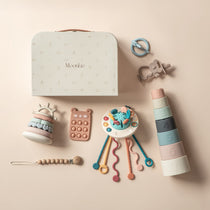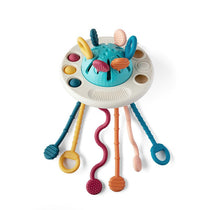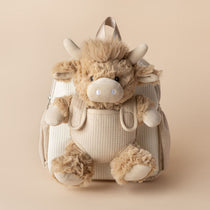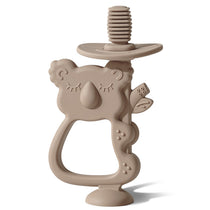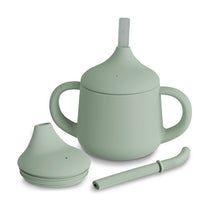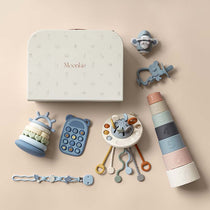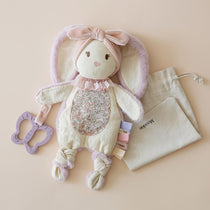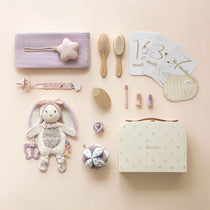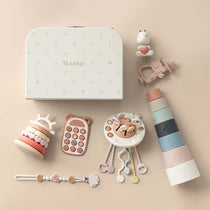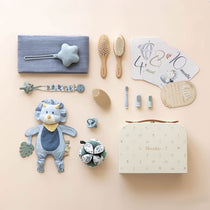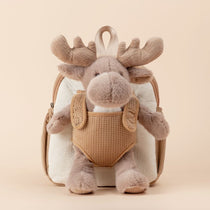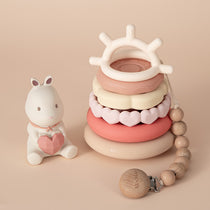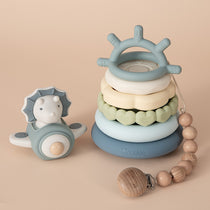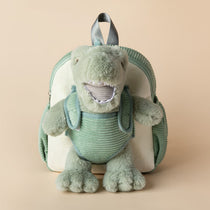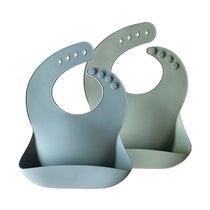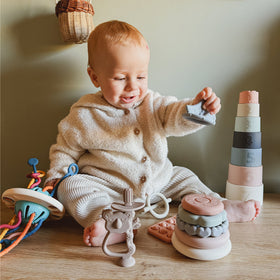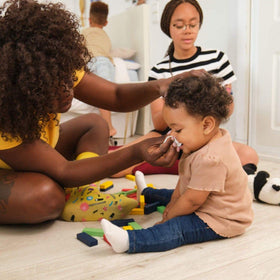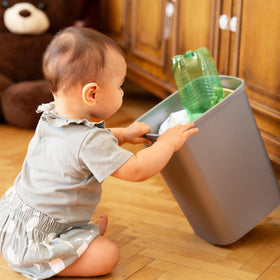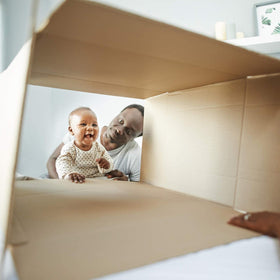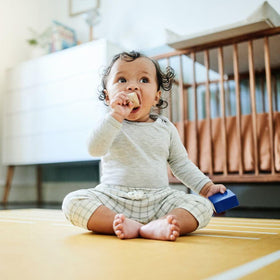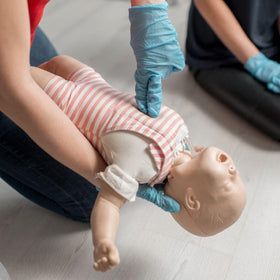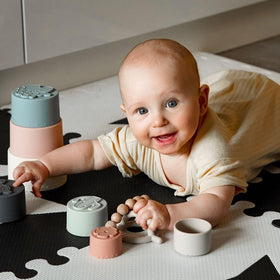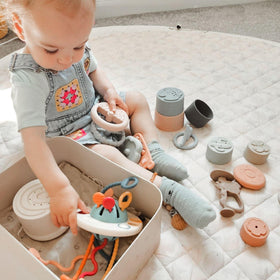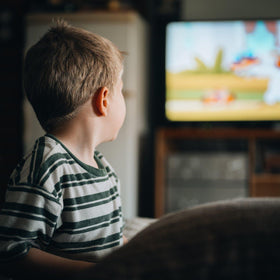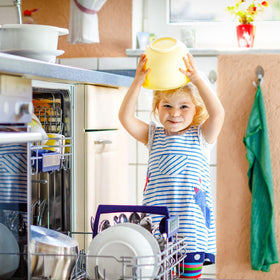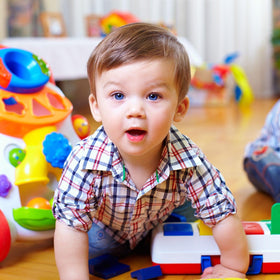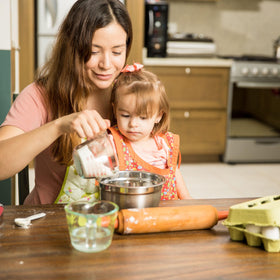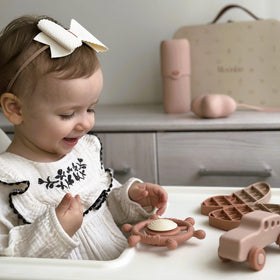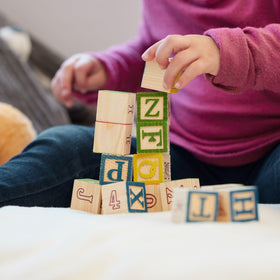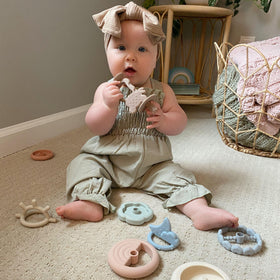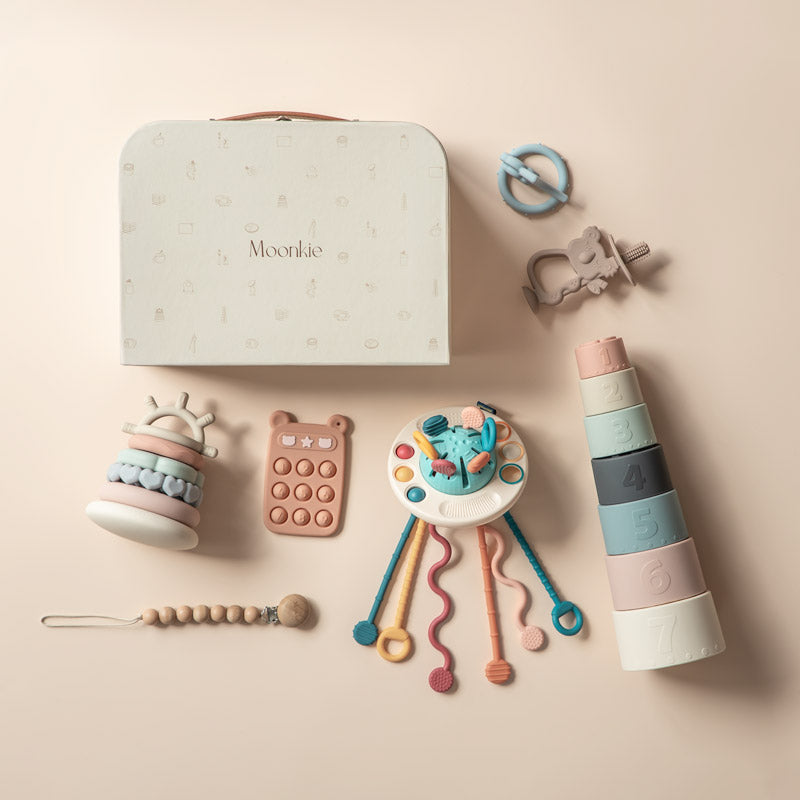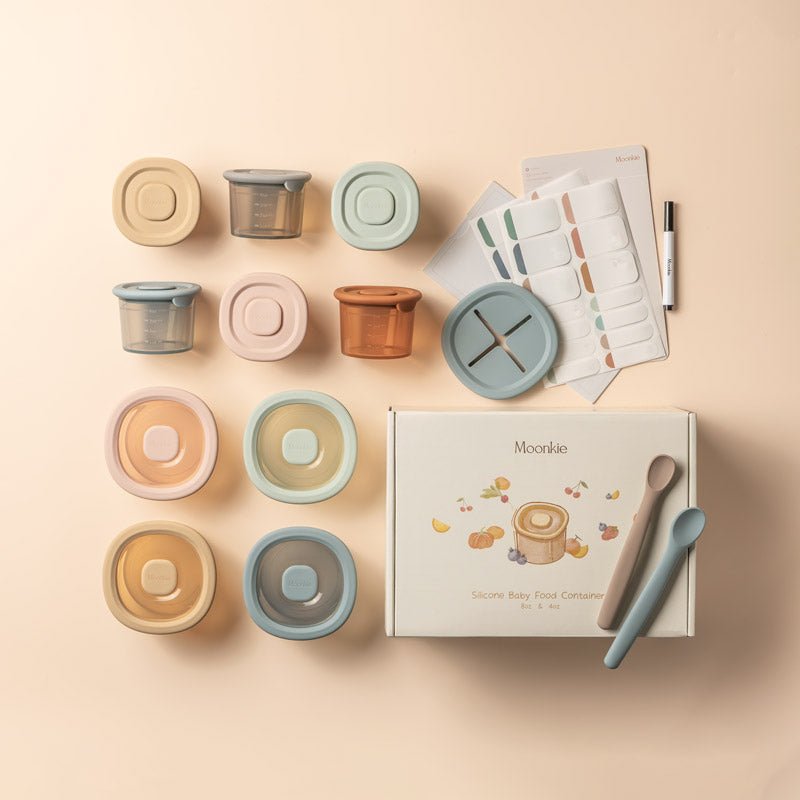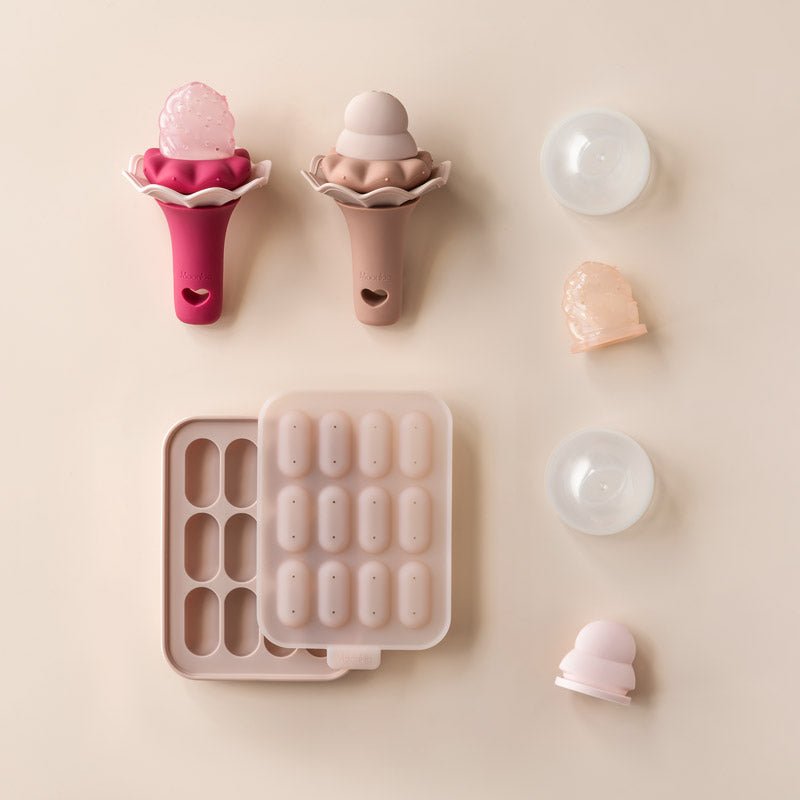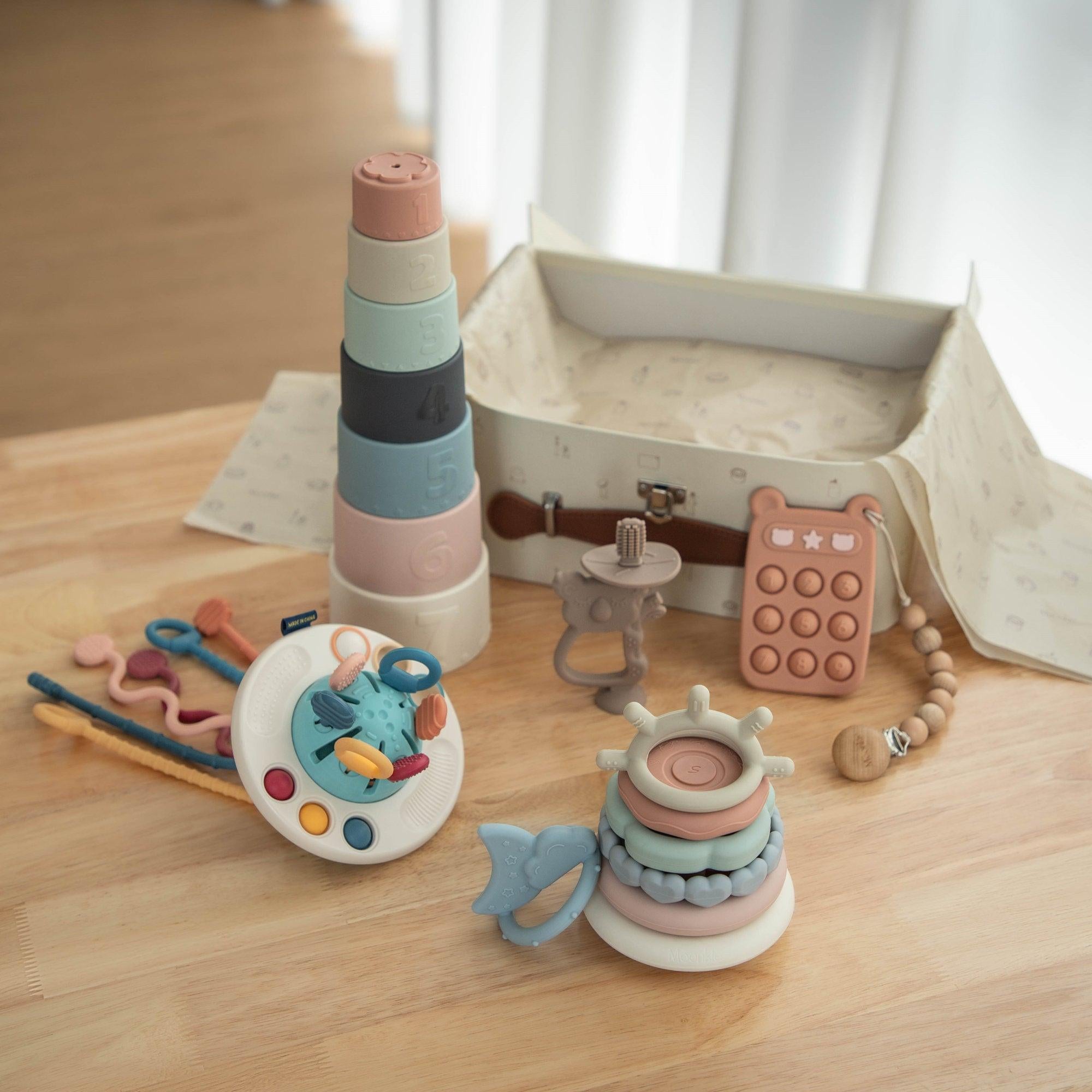In love with the Montessori approach but struggling to actually apply it? Whether it's budget, time, work, or other life factors, applying the Montessori principles to your parenting style may seem impossible some days. However, Montessori-inspired parenting is possible with clarity, commitment, and consistency!
Montessori-inspired parenting means applying the Montessori Method principles to your parenting style. Based on the teachings of the Italian educator Maria Montessori, this approach emphasizes independence, self-discipline, and hands-on learning to lay a solid foundation for successful living.
But as with most things in raising children, this is easier said than done. This article will go over some big-picture elements and zoom into the nitty gritty of mindset, behavioral management, and daily application.
What Are the Principles of the Montessori Method?
Montessori-inspired parenting, like the Montessori education style, is based on the idea that children are naturally curious and capable of learning through hands-on experiences.
Parents determined to raise their kids Montessori-style create a supportive environment that fosters independence, self-discipline, and a love of learning by following each child's interests and abilities rather than imposing a predetermined curriculum or letting kids run amuck and get into trouble.
But what are these Montessori principles, and how can parents apply them at home?
1. Respect the Child
Humans must respect one another as unique individuals with free will. Respecting your child means recognizing his right to choose, learn at his own pace, and the space to correct himself.
This does NOT mean letting the child do whatever he pleases, spoiling him, or not disciplining him. It means recognizing your child's uniqueness, desires, interests, and decision-making ability. It also means giving your child (once old enough) a chance to come clean about a mistake and make it right.
2. Young Children Have an Absorbent Mind
Dr. Maria Montessori observed that the first six years of a child's life are the most vital to who that child will eventually become. Why? Because children grow and develop rapidly in their early years, they are sponges soaking up everything there is to know around them!
What Dr. Montessori observed in the early 1900s has been proven by modern neural science:
Children create 1 million new neural connections every second before their third birthday (source).
90% of the brain has developed by age five (source).
Before their first birthday, babies can perceive the tiny nuances in spoken language before tuning them out to focus on a native language (source).
Many more studies exist on how children develop cognitively, socially, emotionally, and physically in these early years. I review these more specifically for the first twelve months in 7 Things Every Parent Should Know About the Early Stages of Child Development.
The main takeaway is that babies, toddlers, and young children have absorbent minds, so everything you do as a parent in daily life (discipline, care, feeding, reading, playing, etc.) has an exponential impact on your child's well-being.
Ever wake up one day and realize you had a mini-me putting her hands on her hips and bossing people around? Take a second to picture things from her perspective: Where did she pick that up? She observed that behavior somewhere.
3. Children Have Sensitive Periods
Sensitive periods do not describe times when little ones feel big feelings; they are times when a child focuses intently on something to figure it out. These "sensitive periods" are windows of opportunity to learn something about the world well.

For example, while playing with funny-shaped stacking toys one day, your toddler may begin focusing intensely on balancing odd shapes on one another. You'll see him enter a zone of thought that doesn't pay attention to anyone or anything else because he is observing and learning.
Learning to tune into your child's sensitive periods will make learning go a long way. But the catch is that you've got to be flexible about what your child chooses to focus on.
You can arrange certain activities in a play area for your child to work on but don't feel upset if he only chooses one of those in a day or becomes extremely focused on something outside at recess.
Learning moments happen all the time, and they may be intense and brief or take hours. Just be flexible to feed that mind while it's hungry to learn!
4. Individualized Learning is Best
Another principle of the Montessori Method is individualized learning, which is actually easier to do at home! Personalized learning hones in on each child's unique interests, needs, and developmental stage to create the best results.
When kids are given the space and tools to learn things that interest them or learn about things they don't care for in their own way, they learn so much more efficiently and effectively. Homeschooling families know this to be true!
Standardized learning benefits systems, organizations, and governments, but individualized learning benefits each unique person's interests and learning styles.
5. The Whole Child Needs Education
Kids shouldn't sit for hours in a classroom day after day! They must move, share, interact with real-world things, and work together. Kids learn best through playing and participating because it engages them intellectually, physically, emotionally, and socially.

One of the best things parents can offer their children is involvement in real-life tasks. These can be chores around the house, going to work with you, gardening, volunteering, yard work, or anything else you do in a week.
The point is to involve your child in the things they see you doing so that they learn lessons and skills they already understand are relevant.
Do you remember being introduced to concepts you thought you would never use as a kid? I was that smart alec who repeatedly asked why we needed to memorize prime numbers or practice formal grammar when no adults in my life could tell me when they used that knowledge after school.
I didn't have a problem learning most other concepts because my parents could show me their relevance to their jobs or daily life (helping me connect to multiple areas of life). Still, the argument for prime numbers and formal grammar pretty much came down to "Because you need to pass tests and graduate high school."
But when my parents took a concept I learned in school, and we actually got to apply it in a real-life task, I learned it for life and gained confidence and competence.
6. Children Should Be Able to Move and Choose Freely
Kids are wiggle worms—the younger they are, the more they move! This is a problem in a traditional classroom where one teacher manages thirty students, but you can't blame the kids because they are meant to move and learn as they go.
Children learn best when they are free to choose what they want to focus on and when they will move on to the next thing. Montessori teachers cater to this need in children by preparing the classroom with activities ahead of time and letting kids move from activity to activity as they please.
When doing Montessori parenting at home, you can set out things to do and make your home days more flexible to give your little one plenty of time for choosing and moving.
7. A Prepared Environment is Key
As mentioned above, Montessori teachers prepare the classroom ahead of time with activities for the children to choose from and move freely between. At home, a prepared space provides natural boundaries that your little one can play in safely and freely.
The space should be uncluttered, organized, and centered on your little one's abilities and interests. Does that mean you need a dinosaur-themed living room? Not at all! But it does mean selecting activities and toys that your little one will appreciate and rotating those out every so often to keep things fresh and interesting.
Don't have much space? Where do you start with making a prepared environment? Read Playful Living: Simple Strategies for Setting Up a Productive Playtime in Your Living Room for some ideas.
8. Kids Want to Learn!
The Montessori Method is built on the idea that learning is rewarding in and of itself, so kids can't help themselves. You don't have to bribe them with stickers, treats, and field trips; just make learning a lifestyle.

How on earth are you supposed to make learning a lifestyle? Well, prioritize your child's interests and learning pace above events and running around in town. Stop and smell the roses, play in the rain, and stare at interesting rocks while walking the dog. Let your child take the lead by stopping to observe the things she does.
This is not easy, though. You'll have to say no to a lot of opportunities and events. Though you may feel like having people to see and places to go every day is critical for living a colorful life, your baby, toddler, or young child is not there yet.
In fact, being yanked around to all the things may cause more stress in your child than it's worth. Constantly having timers and hearing, "Hurry up, it's time to go," is not conducive to exploring at one's own pace.
Kids learn by playing, so give space in location and schedule to let your little one discover through playing (source).
9. Kids Need to Practice Independence
Let's be honest: many of us have longed for the day when our children will no longer need help using the toilet, cleaning up, or feeding themselves. Children need to practice handling self-care, cleaning up after themselves, and doing real-world tasks to build their confidence and competence in life.
Little ones progress through a series of realizations of self in their first three to five years. They go from identifying themselves physically to identifying themselves by what they can do. Then, they listen to what others say they are before defining themselves by their connections to familiar people, places, and things (source).
By providing opportunities for your child to practice doing tasks they see you do on their own, you are encouraging their sense of self and belonging to the home and family.
10. Kids Will Teach Themselves
If provided the space and activities to do so, kids will practically teach themselves! They are curious, wiggly, and motivated to soak up everything around them. You've simply got to set boundaries for safety and age appropriateness.

If your little one acts out a lot or gets herself into trouble when you turn around for two minutes, you can bet that your child is teaching herself. Children push boundaries, but this is often out of not knowing better, testing your limits, or making sure you are paying attention.
Natural Consequences
One of my favorite ways to let kids teach themselves is by using natural consequences. When I set a boundary, it is usually for safety, comfort, or respect for everyone in the home. I make this rule or boundary clear and ensure there are better choices around.
Though I could warn my children every time they test boundaries or lecture them when they cross them, I have found that simply letting them do so and reaping a logical consequence right away works best. Why? Because kids will teach themselves.
Parents must be consistent with the consequences, which must be logically tied to breaking a rule. When those things are clear, children learn well and even begin disciplining themselves.
For example, if a toddler begins throwing his food, he should be told, "No, thank you. Big kids don't throw food." If they do it again, his independence in that activity should be taken away right then, and he should be spoon-fed like a baby.
If the toddler is spanked or put in a time-out corner for every rule they break, he will harden himself, which does nothing good for future self-regulation and discipline.
Creating natural consequences requires creativity, consistency, and time--believe me, I know. However, natural consequences don't require lectures because they make sense to your child, and whatever makes sense sinks in for long-term use.
In a Nutshell
Practicing Montessori-inspired parenting is a lifestyle choice—not a once-a-week thing. Though most parents would likely agree with the principles of the Montessori Method to a point, not everyone is on board with the idea of parenting this way because it takes time and effort.
Whatever you choose to do in your parenting style, keep your head up! Parenting is tough and requires a lot of self-discipline, self-control, and selflessness. If you struggle with your temper or patience, reach out to parent friends for accountability. It takes a village!

